ENGT5219 Engineering Business Environment
VerifiedAdded on 2021/11/03
|12
|2970
|43
AI Summary
Contribute Materials
Your contribution can guide someone’s learning journey. Share your
documents today.
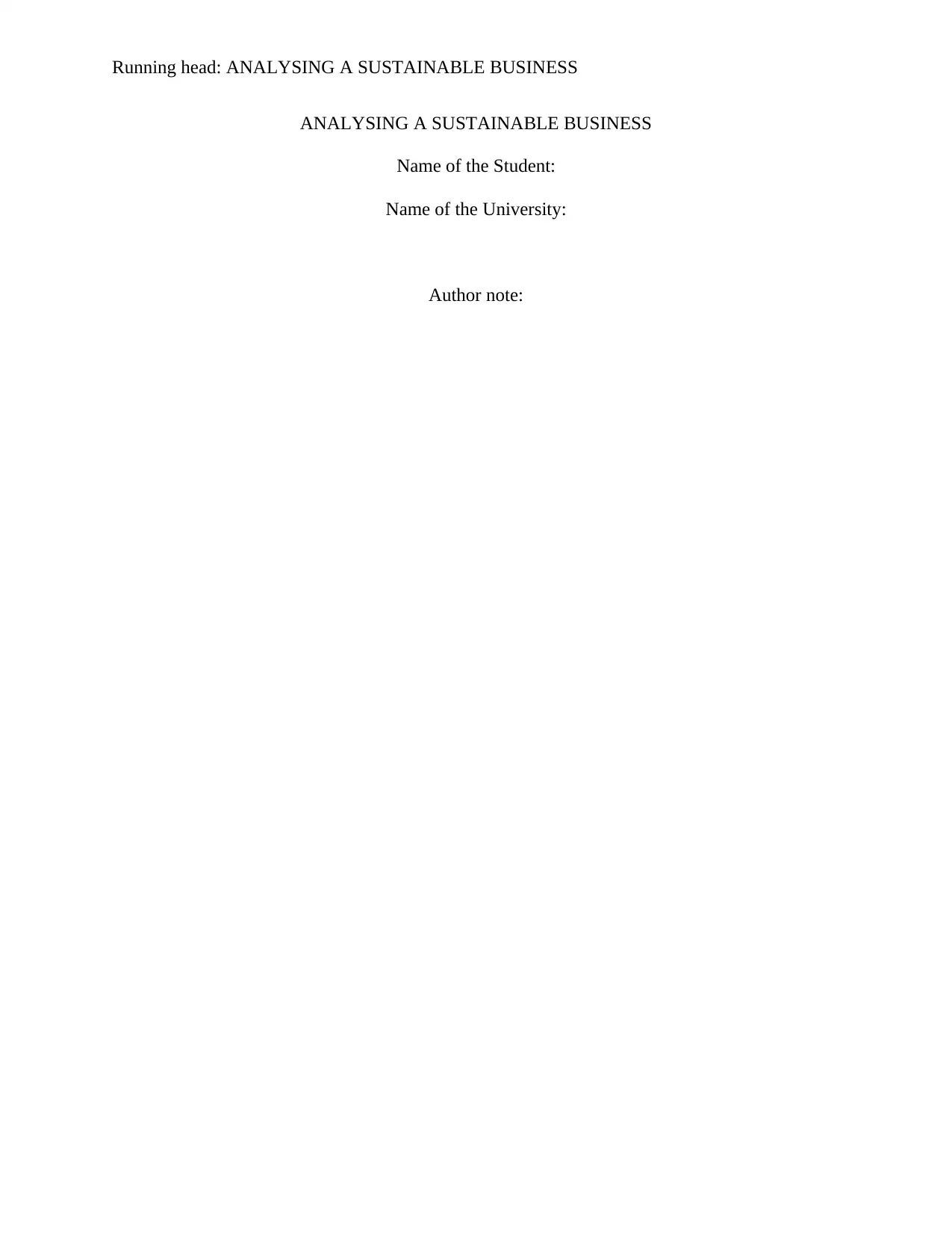
Running head: ANALYSING A SUSTAINABLE BUSINESS
ANALYSING A SUSTAINABLE BUSINESS
Name of the Student:
Name of the University:
Author note:
ANALYSING A SUSTAINABLE BUSINESS
Name of the Student:
Name of the University:
Author note:
Secure Best Marks with AI Grader
Need help grading? Try our AI Grader for instant feedback on your assignments.
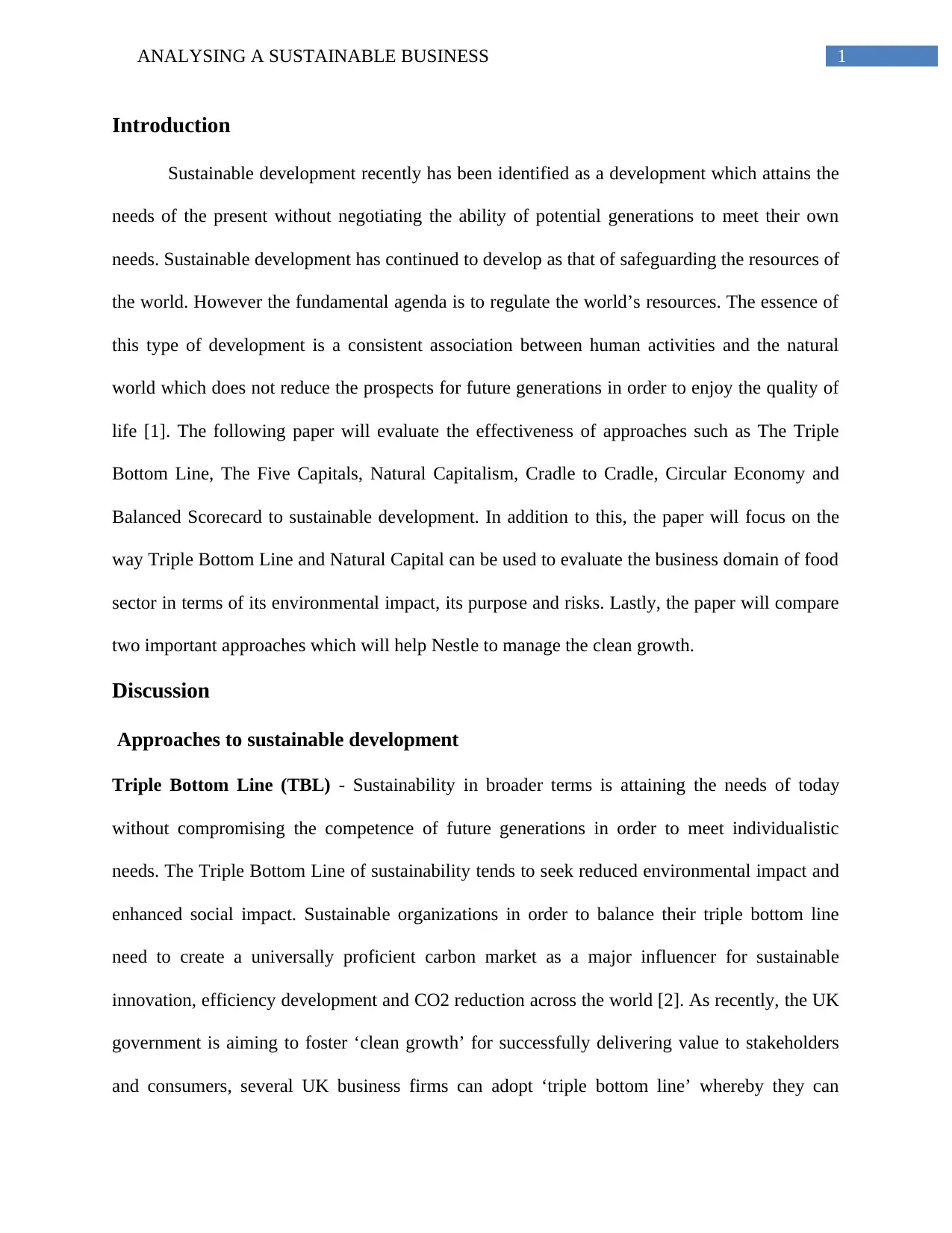
1ANALYSING A SUSTAINABLE BUSINESS
Introduction
Sustainable development recently has been identified as a development which attains the
needs of the present without negotiating the ability of potential generations to meet their own
needs. Sustainable development has continued to develop as that of safeguarding the resources of
the world. However the fundamental agenda is to regulate the world’s resources. The essence of
this type of development is a consistent association between human activities and the natural
world which does not reduce the prospects for future generations in order to enjoy the quality of
life [1]. The following paper will evaluate the effectiveness of approaches such as The Triple
Bottom Line, The Five Capitals, Natural Capitalism, Cradle to Cradle, Circular Economy and
Balanced Scorecard to sustainable development. In addition to this, the paper will focus on the
way Triple Bottom Line and Natural Capital can be used to evaluate the business domain of food
sector in terms of its environmental impact, its purpose and risks. Lastly, the paper will compare
two important approaches which will help Nestle to manage the clean growth.
Discussion
Approaches to sustainable development
Triple Bottom Line (TBL) - Sustainability in broader terms is attaining the needs of today
without compromising the competence of future generations in order to meet individualistic
needs. The Triple Bottom Line of sustainability tends to seek reduced environmental impact and
enhanced social impact. Sustainable organizations in order to balance their triple bottom line
need to create a universally proficient carbon market as a major influencer for sustainable
innovation, efficiency development and CO2 reduction across the world [2]. As recently, the UK
government is aiming to foster ‘clean growth’ for successfully delivering value to stakeholders
and consumers, several UK business firms can adopt ‘triple bottom line’ whereby they can
Introduction
Sustainable development recently has been identified as a development which attains the
needs of the present without negotiating the ability of potential generations to meet their own
needs. Sustainable development has continued to develop as that of safeguarding the resources of
the world. However the fundamental agenda is to regulate the world’s resources. The essence of
this type of development is a consistent association between human activities and the natural
world which does not reduce the prospects for future generations in order to enjoy the quality of
life [1]. The following paper will evaluate the effectiveness of approaches such as The Triple
Bottom Line, The Five Capitals, Natural Capitalism, Cradle to Cradle, Circular Economy and
Balanced Scorecard to sustainable development. In addition to this, the paper will focus on the
way Triple Bottom Line and Natural Capital can be used to evaluate the business domain of food
sector in terms of its environmental impact, its purpose and risks. Lastly, the paper will compare
two important approaches which will help Nestle to manage the clean growth.
Discussion
Approaches to sustainable development
Triple Bottom Line (TBL) - Sustainability in broader terms is attaining the needs of today
without compromising the competence of future generations in order to meet individualistic
needs. The Triple Bottom Line of sustainability tends to seek reduced environmental impact and
enhanced social impact. Sustainable organizations in order to balance their triple bottom line
need to create a universally proficient carbon market as a major influencer for sustainable
innovation, efficiency development and CO2 reduction across the world [2]. As recently, the UK
government is aiming to foster ‘clean growth’ for successfully delivering value to stakeholders
and consumers, several UK business firms can adopt ‘triple bottom line’ whereby they can
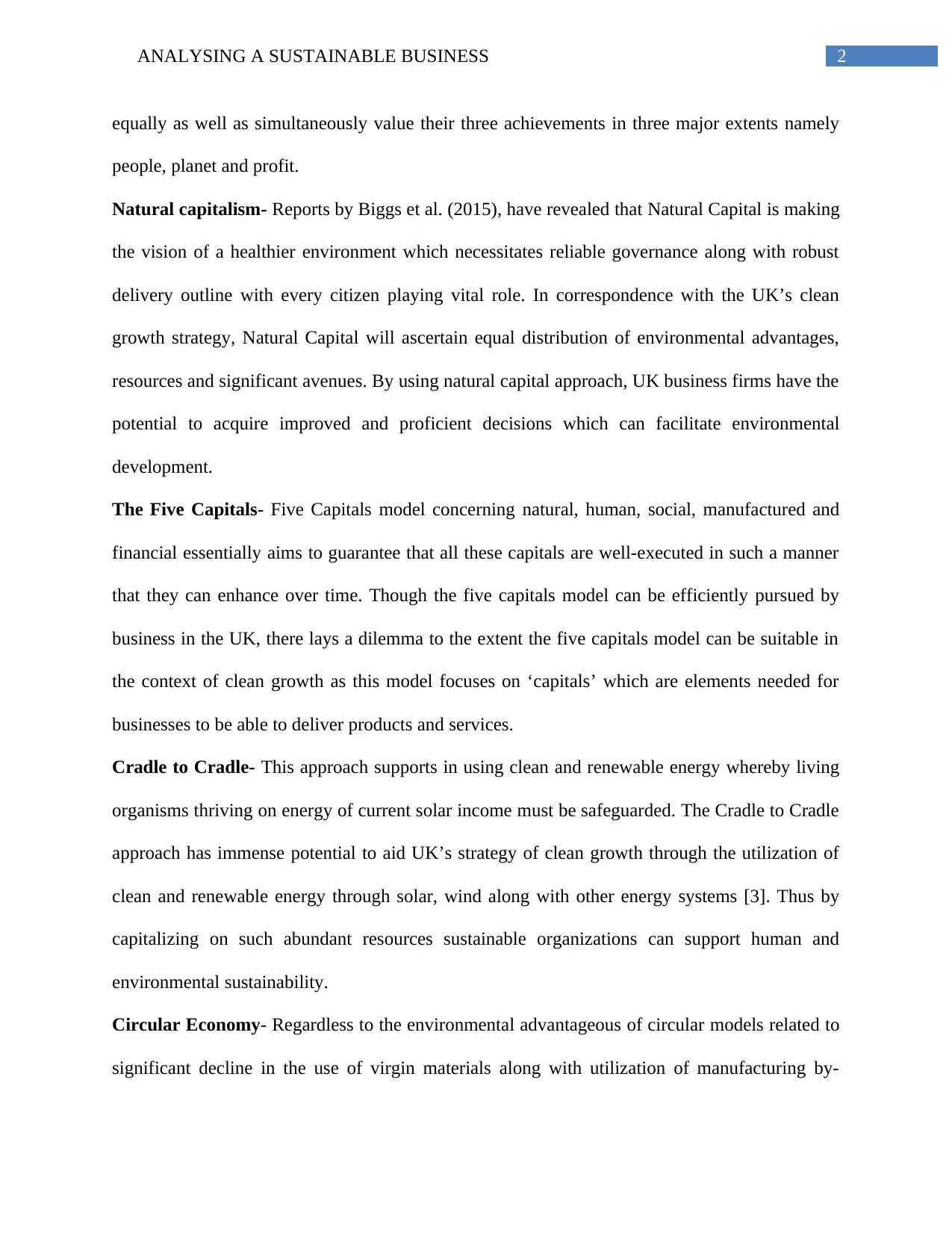
2ANALYSING A SUSTAINABLE BUSINESS
equally as well as simultaneously value their three achievements in three major extents namely
people, planet and profit.
Natural capitalism- Reports by Biggs et al. (2015), have revealed that Natural Capital is making
the vision of a healthier environment which necessitates reliable governance along with robust
delivery outline with every citizen playing vital role. In correspondence with the UK’s clean
growth strategy, Natural Capital will ascertain equal distribution of environmental advantages,
resources and significant avenues. By using natural capital approach, UK business firms have the
potential to acquire improved and proficient decisions which can facilitate environmental
development.
The Five Capitals- Five Capitals model concerning natural, human, social, manufactured and
financial essentially aims to guarantee that all these capitals are well-executed in such a manner
that they can enhance over time. Though the five capitals model can be efficiently pursued by
business in the UK, there lays a dilemma to the extent the five capitals model can be suitable in
the context of clean growth as this model focuses on ‘capitals’ which are elements needed for
businesses to be able to deliver products and services.
Cradle to Cradle- This approach supports in using clean and renewable energy whereby living
organisms thriving on energy of current solar income must be safeguarded. The Cradle to Cradle
approach has immense potential to aid UK’s strategy of clean growth through the utilization of
clean and renewable energy through solar, wind along with other energy systems [3]. Thus by
capitalizing on such abundant resources sustainable organizations can support human and
environmental sustainability.
Circular Economy- Regardless to the environmental advantageous of circular models related to
significant decline in the use of virgin materials along with utilization of manufacturing by-
equally as well as simultaneously value their three achievements in three major extents namely
people, planet and profit.
Natural capitalism- Reports by Biggs et al. (2015), have revealed that Natural Capital is making
the vision of a healthier environment which necessitates reliable governance along with robust
delivery outline with every citizen playing vital role. In correspondence with the UK’s clean
growth strategy, Natural Capital will ascertain equal distribution of environmental advantages,
resources and significant avenues. By using natural capital approach, UK business firms have the
potential to acquire improved and proficient decisions which can facilitate environmental
development.
The Five Capitals- Five Capitals model concerning natural, human, social, manufactured and
financial essentially aims to guarantee that all these capitals are well-executed in such a manner
that they can enhance over time. Though the five capitals model can be efficiently pursued by
business in the UK, there lays a dilemma to the extent the five capitals model can be suitable in
the context of clean growth as this model focuses on ‘capitals’ which are elements needed for
businesses to be able to deliver products and services.
Cradle to Cradle- This approach supports in using clean and renewable energy whereby living
organisms thriving on energy of current solar income must be safeguarded. The Cradle to Cradle
approach has immense potential to aid UK’s strategy of clean growth through the utilization of
clean and renewable energy through solar, wind along with other energy systems [3]. Thus by
capitalizing on such abundant resources sustainable organizations can support human and
environmental sustainability.
Circular Economy- Regardless to the environmental advantageous of circular models related to
significant decline in the use of virgin materials along with utilization of manufacturing by-
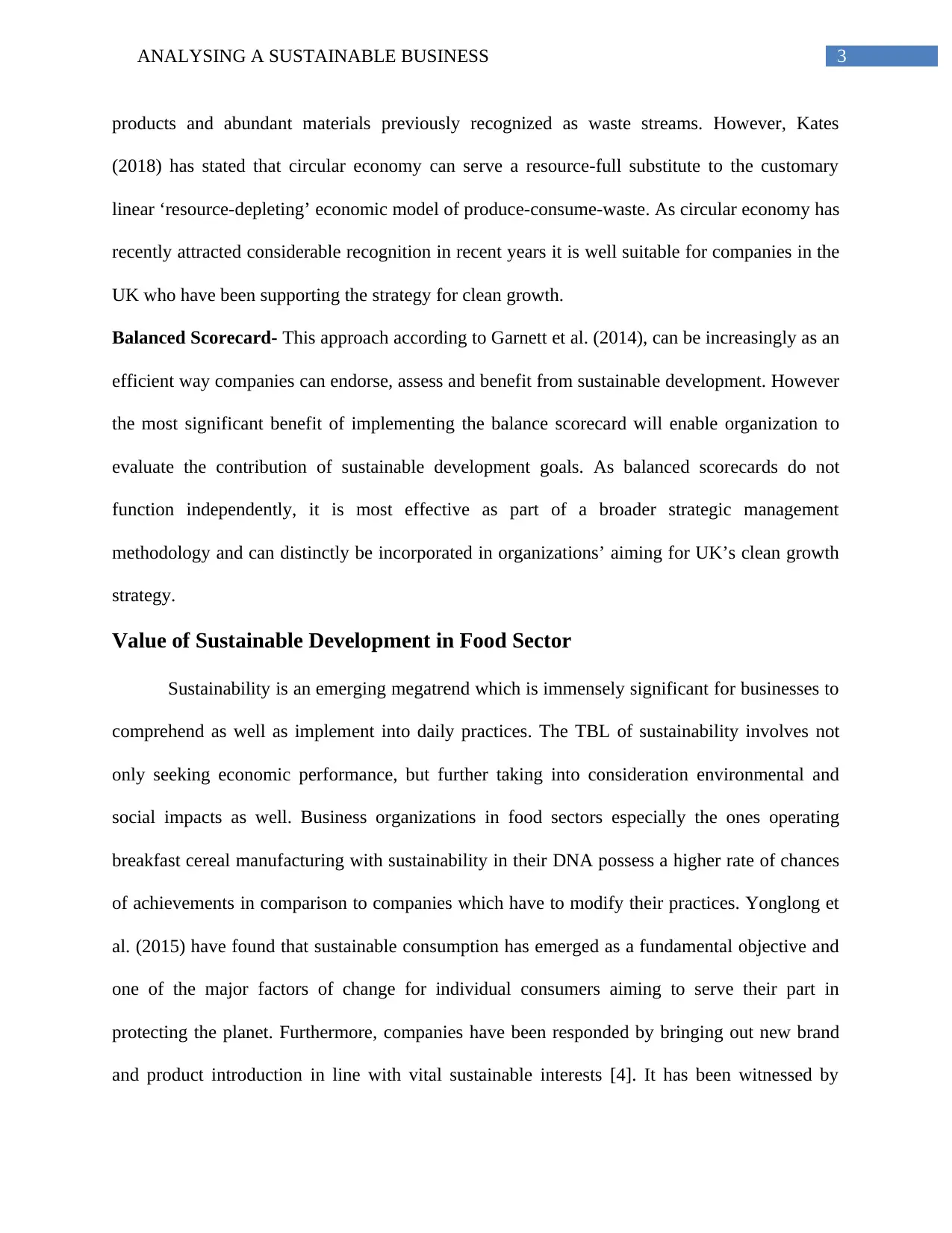
3ANALYSING A SUSTAINABLE BUSINESS
products and abundant materials previously recognized as waste streams. However, Kates
(2018) has stated that circular economy can serve a resource-full substitute to the customary
linear ‘resource-depleting’ economic model of produce-consume-waste. As circular economy has
recently attracted considerable recognition in recent years it is well suitable for companies in the
UK who have been supporting the strategy for clean growth.
Balanced Scorecard- This approach according to Garnett et al. (2014), can be increasingly as an
efficient way companies can endorse, assess and benefit from sustainable development. However
the most significant benefit of implementing the balance scorecard will enable organization to
evaluate the contribution of sustainable development goals. As balanced scorecards do not
function independently, it is most effective as part of a broader strategic management
methodology and can distinctly be incorporated in organizations’ aiming for UK’s clean growth
strategy.
Value of Sustainable Development in Food Sector
Sustainability is an emerging megatrend which is immensely significant for businesses to
comprehend as well as implement into daily practices. The TBL of sustainability involves not
only seeking economic performance, but further taking into consideration environmental and
social impacts as well. Business organizations in food sectors especially the ones operating
breakfast cereal manufacturing with sustainability in their DNA possess a higher rate of chances
of achievements in comparison to companies which have to modify their practices. Yonglong et
al. (2015) have found that sustainable consumption has emerged as a fundamental objective and
one of the major factors of change for individual consumers aiming to serve their part in
protecting the planet. Furthermore, companies have been responded by bringing out new brand
and product introduction in line with vital sustainable interests [4]. It has been witnessed by
products and abundant materials previously recognized as waste streams. However, Kates
(2018) has stated that circular economy can serve a resource-full substitute to the customary
linear ‘resource-depleting’ economic model of produce-consume-waste. As circular economy has
recently attracted considerable recognition in recent years it is well suitable for companies in the
UK who have been supporting the strategy for clean growth.
Balanced Scorecard- This approach according to Garnett et al. (2014), can be increasingly as an
efficient way companies can endorse, assess and benefit from sustainable development. However
the most significant benefit of implementing the balance scorecard will enable organization to
evaluate the contribution of sustainable development goals. As balanced scorecards do not
function independently, it is most effective as part of a broader strategic management
methodology and can distinctly be incorporated in organizations’ aiming for UK’s clean growth
strategy.
Value of Sustainable Development in Food Sector
Sustainability is an emerging megatrend which is immensely significant for businesses to
comprehend as well as implement into daily practices. The TBL of sustainability involves not
only seeking economic performance, but further taking into consideration environmental and
social impacts as well. Business organizations in food sectors especially the ones operating
breakfast cereal manufacturing with sustainability in their DNA possess a higher rate of chances
of achievements in comparison to companies which have to modify their practices. Yonglong et
al. (2015) have found that sustainable consumption has emerged as a fundamental objective and
one of the major factors of change for individual consumers aiming to serve their part in
protecting the planet. Furthermore, companies have been responded by bringing out new brand
and product introduction in line with vital sustainable interests [4]. It has been witnessed by
Secure Best Marks with AI Grader
Need help grading? Try our AI Grader for instant feedback on your assignments.
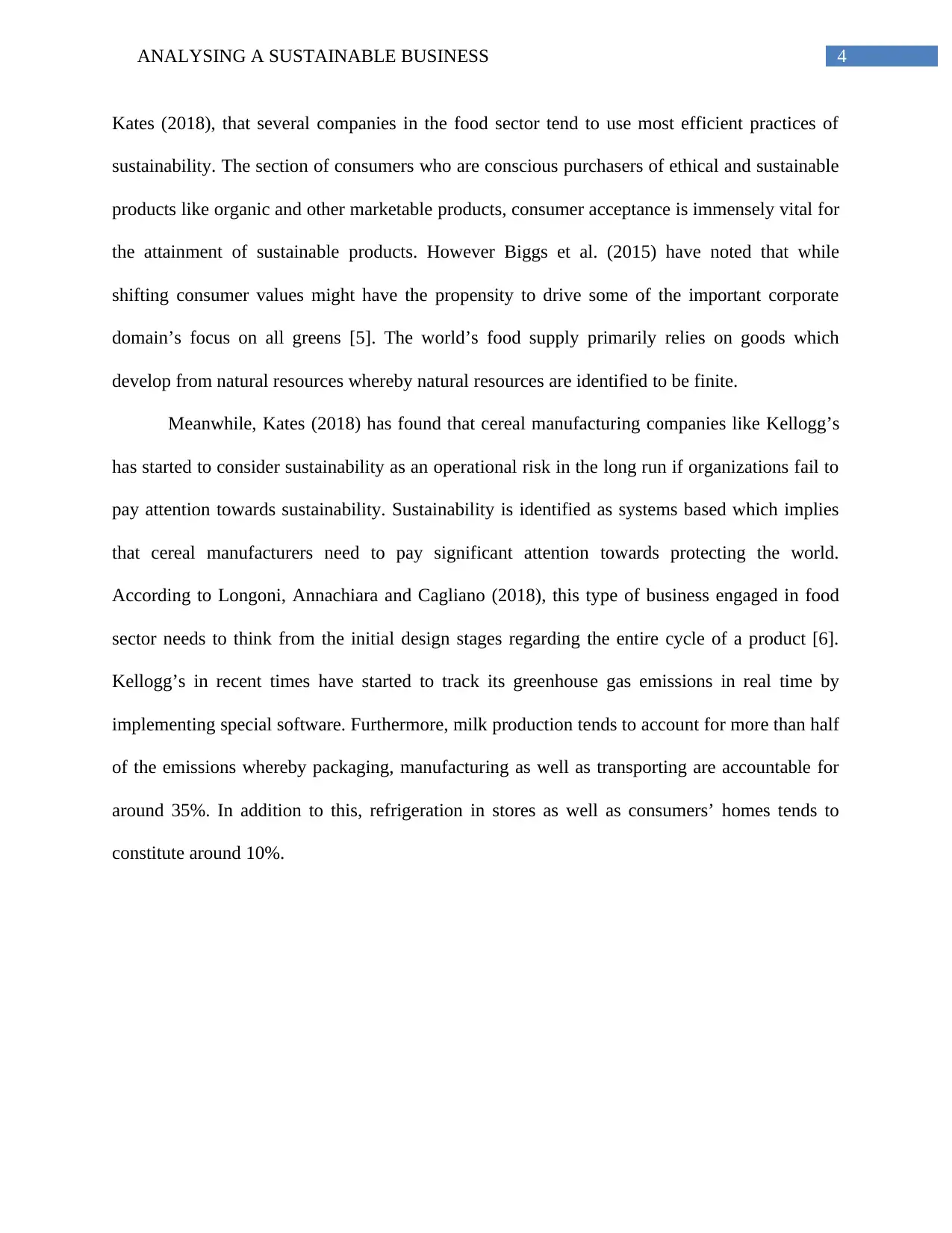
4ANALYSING A SUSTAINABLE BUSINESS
Kates (2018), that several companies in the food sector tend to use most efficient practices of
sustainability. The section of consumers who are conscious purchasers of ethical and sustainable
products like organic and other marketable products, consumer acceptance is immensely vital for
the attainment of sustainable products. However Biggs et al. (2015) have noted that while
shifting consumer values might have the propensity to drive some of the important corporate
domain’s focus on all greens [5]. The world’s food supply primarily relies on goods which
develop from natural resources whereby natural resources are identified to be finite.
Meanwhile, Kates (2018) has found that cereal manufacturing companies like Kellogg’s
has started to consider sustainability as an operational risk in the long run if organizations fail to
pay attention towards sustainability. Sustainability is identified as systems based which implies
that cereal manufacturers need to pay significant attention towards protecting the world.
According to Longoni, Annachiara and Cagliano (2018), this type of business engaged in food
sector needs to think from the initial design stages regarding the entire cycle of a product [6].
Kellogg’s in recent times have started to track its greenhouse gas emissions in real time by
implementing special software. Furthermore, milk production tends to account for more than half
of the emissions whereby packaging, manufacturing as well as transporting are accountable for
around 35%. In addition to this, refrigeration in stores as well as consumers’ homes tends to
constitute around 10%.
Kates (2018), that several companies in the food sector tend to use most efficient practices of
sustainability. The section of consumers who are conscious purchasers of ethical and sustainable
products like organic and other marketable products, consumer acceptance is immensely vital for
the attainment of sustainable products. However Biggs et al. (2015) have noted that while
shifting consumer values might have the propensity to drive some of the important corporate
domain’s focus on all greens [5]. The world’s food supply primarily relies on goods which
develop from natural resources whereby natural resources are identified to be finite.
Meanwhile, Kates (2018) has found that cereal manufacturing companies like Kellogg’s
has started to consider sustainability as an operational risk in the long run if organizations fail to
pay attention towards sustainability. Sustainability is identified as systems based which implies
that cereal manufacturers need to pay significant attention towards protecting the world.
According to Longoni, Annachiara and Cagliano (2018), this type of business engaged in food
sector needs to think from the initial design stages regarding the entire cycle of a product [6].
Kellogg’s in recent times have started to track its greenhouse gas emissions in real time by
implementing special software. Furthermore, milk production tends to account for more than half
of the emissions whereby packaging, manufacturing as well as transporting are accountable for
around 35%. In addition to this, refrigeration in stores as well as consumers’ homes tends to
constitute around 10%.
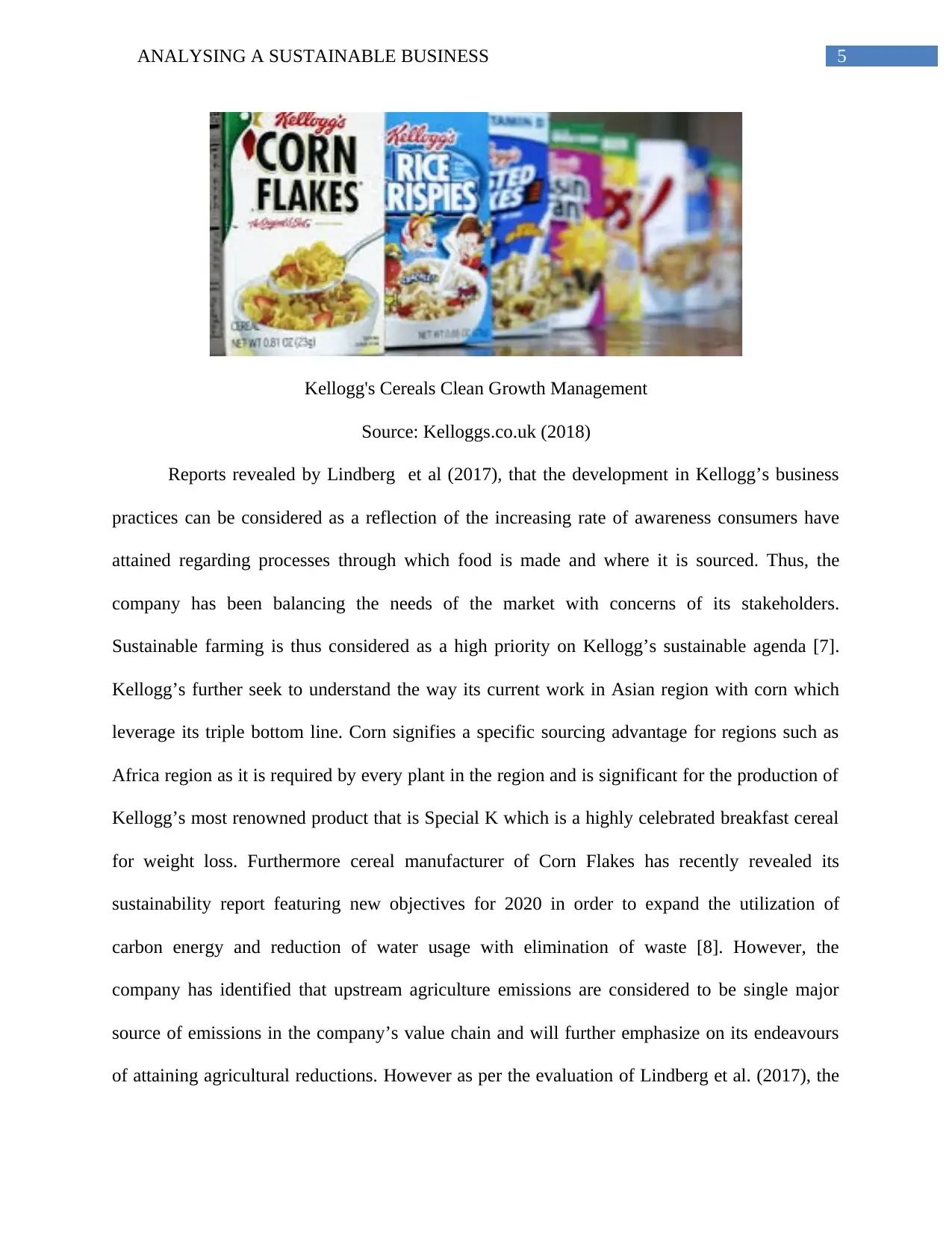
5ANALYSING A SUSTAINABLE BUSINESS
Kellogg's Cereals Clean Growth Management
Source: Kelloggs.co.uk (2018)
Reports revealed by Lindberg et al (2017), that the development in Kellogg’s business
practices can be considered as a reflection of the increasing rate of awareness consumers have
attained regarding processes through which food is made and where it is sourced. Thus, the
company has been balancing the needs of the market with concerns of its stakeholders.
Sustainable farming is thus considered as a high priority on Kellogg’s sustainable agenda [7].
Kellogg’s further seek to understand the way its current work in Asian region with corn which
leverage its triple bottom line. Corn signifies a specific sourcing advantage for regions such as
Africa region as it is required by every plant in the region and is significant for the production of
Kellogg’s most renowned product that is Special K which is a highly celebrated breakfast cereal
for weight loss. Furthermore cereal manufacturer of Corn Flakes has recently revealed its
sustainability report featuring new objectives for 2020 in order to expand the utilization of
carbon energy and reduction of water usage with elimination of waste [8]. However, the
company has identified that upstream agriculture emissions are considered to be single major
source of emissions in the company’s value chain and will further emphasize on its endeavours
of attaining agricultural reductions. However as per the evaluation of Lindberg et al. (2017), the
Kellogg's Cereals Clean Growth Management
Source: Kelloggs.co.uk (2018)
Reports revealed by Lindberg et al (2017), that the development in Kellogg’s business
practices can be considered as a reflection of the increasing rate of awareness consumers have
attained regarding processes through which food is made and where it is sourced. Thus, the
company has been balancing the needs of the market with concerns of its stakeholders.
Sustainable farming is thus considered as a high priority on Kellogg’s sustainable agenda [7].
Kellogg’s further seek to understand the way its current work in Asian region with corn which
leverage its triple bottom line. Corn signifies a specific sourcing advantage for regions such as
Africa region as it is required by every plant in the region and is significant for the production of
Kellogg’s most renowned product that is Special K which is a highly celebrated breakfast cereal
for weight loss. Furthermore cereal manufacturer of Corn Flakes has recently revealed its
sustainability report featuring new objectives for 2020 in order to expand the utilization of
carbon energy and reduction of water usage with elimination of waste [8]. However, the
company has identified that upstream agriculture emissions are considered to be single major
source of emissions in the company’s value chain and will further emphasize on its endeavours
of attaining agricultural reductions. However as per the evaluation of Lindberg et al. (2017), the
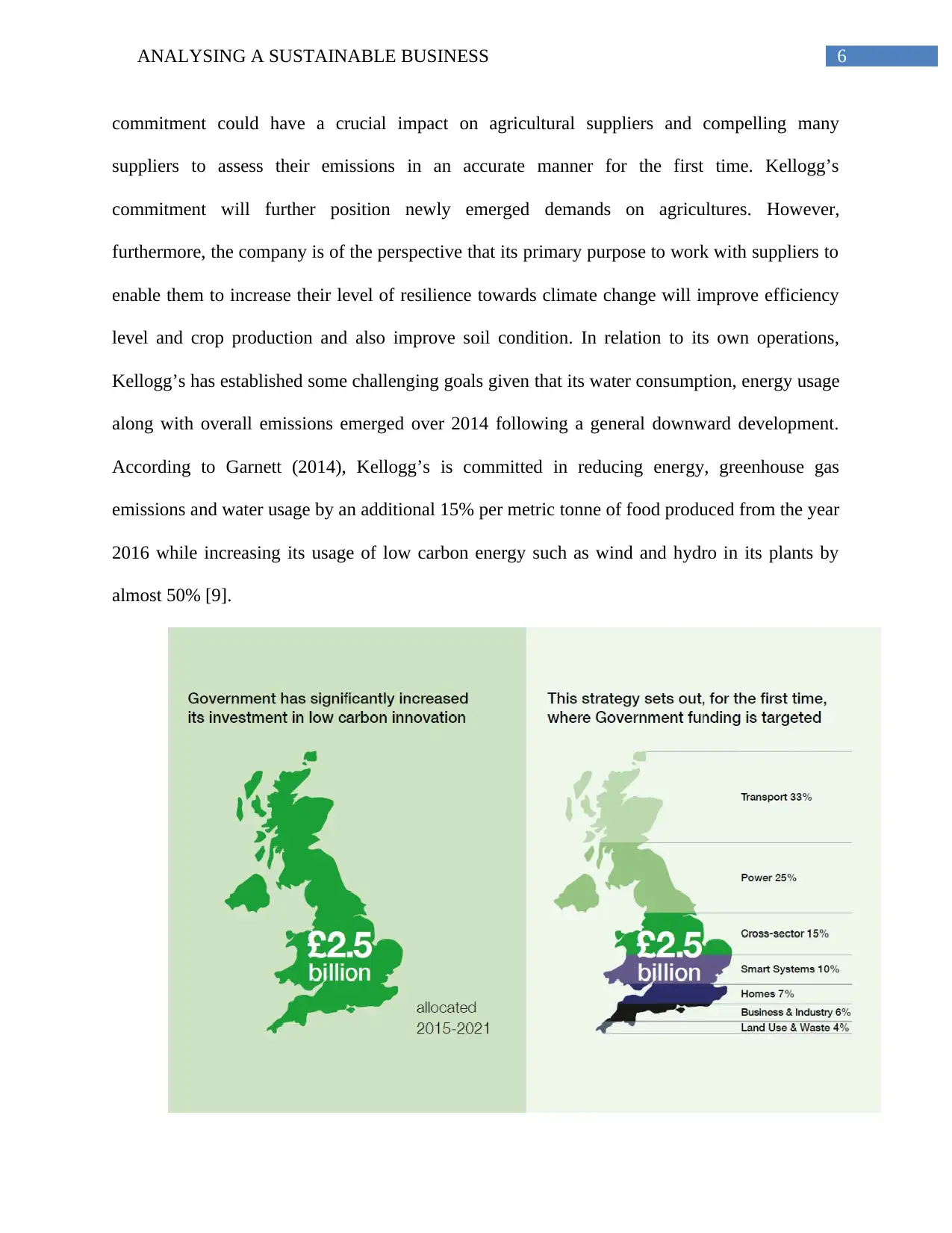
6ANALYSING A SUSTAINABLE BUSINESS
commitment could have a crucial impact on agricultural suppliers and compelling many
suppliers to assess their emissions in an accurate manner for the first time. Kellogg’s
commitment will further position newly emerged demands on agricultures. However,
furthermore, the company is of the perspective that its primary purpose to work with suppliers to
enable them to increase their level of resilience towards climate change will improve efficiency
level and crop production and also improve soil condition. In relation to its own operations,
Kellogg’s has established some challenging goals given that its water consumption, energy usage
along with overall emissions emerged over 2014 following a general downward development.
According to Garnett (2014), Kellogg’s is committed in reducing energy, greenhouse gas
emissions and water usage by an additional 15% per metric tonne of food produced from the year
2016 while increasing its usage of low carbon energy such as wind and hydro in its plants by
almost 50% [9].
commitment could have a crucial impact on agricultural suppliers and compelling many
suppliers to assess their emissions in an accurate manner for the first time. Kellogg’s
commitment will further position newly emerged demands on agricultures. However,
furthermore, the company is of the perspective that its primary purpose to work with suppliers to
enable them to increase their level of resilience towards climate change will improve efficiency
level and crop production and also improve soil condition. In relation to its own operations,
Kellogg’s has established some challenging goals given that its water consumption, energy usage
along with overall emissions emerged over 2014 following a general downward development.
According to Garnett (2014), Kellogg’s is committed in reducing energy, greenhouse gas
emissions and water usage by an additional 15% per metric tonne of food produced from the year
2016 while increasing its usage of low carbon energy such as wind and hydro in its plants by
almost 50% [9].
Paraphrase This Document
Need a fresh take? Get an instant paraphrase of this document with our AI Paraphraser
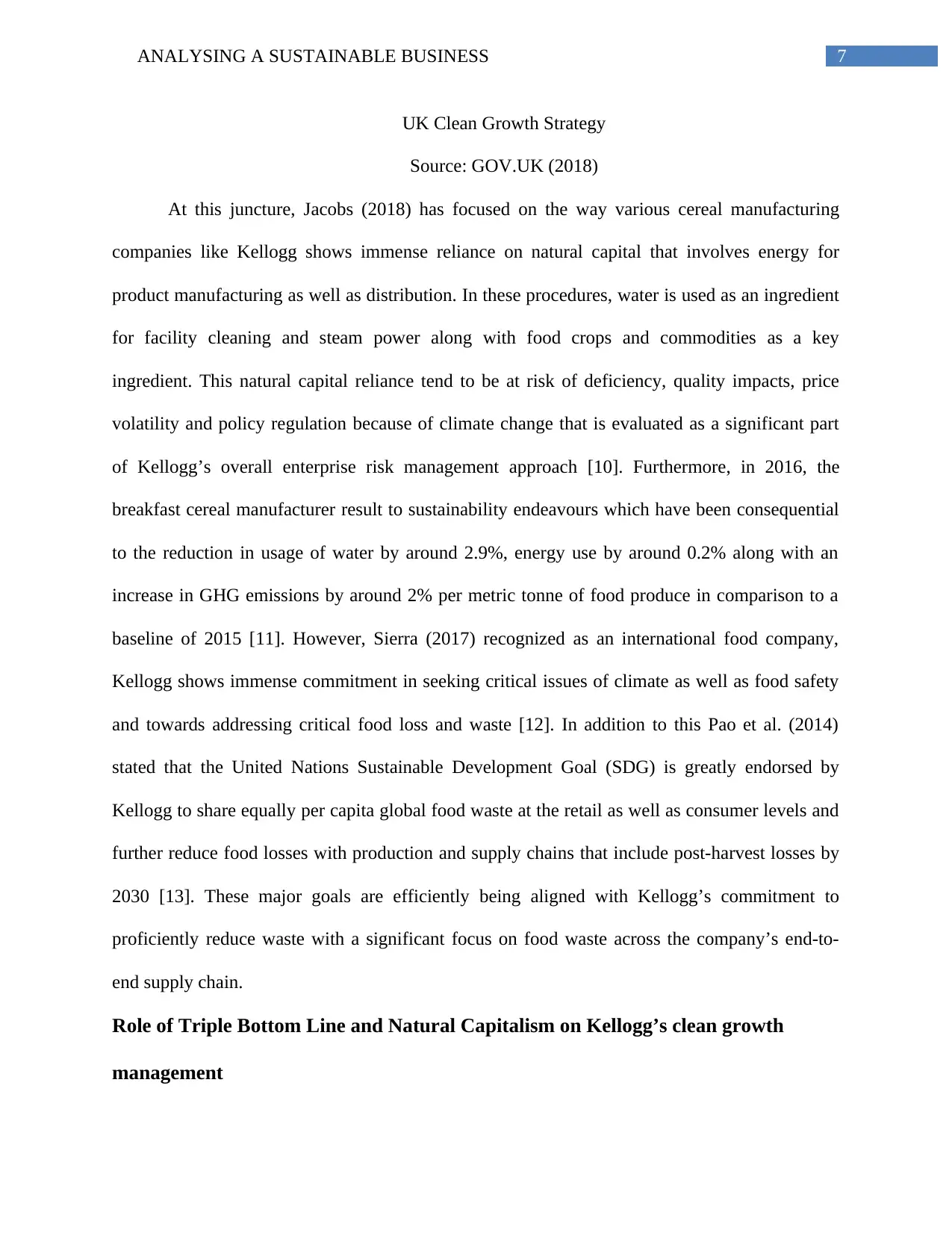
7ANALYSING A SUSTAINABLE BUSINESS
UK Clean Growth Strategy
Source: GOV.UK (2018)
At this juncture, Jacobs (2018) has focused on the way various cereal manufacturing
companies like Kellogg shows immense reliance on natural capital that involves energy for
product manufacturing as well as distribution. In these procedures, water is used as an ingredient
for facility cleaning and steam power along with food crops and commodities as a key
ingredient. This natural capital reliance tend to be at risk of deficiency, quality impacts, price
volatility and policy regulation because of climate change that is evaluated as a significant part
of Kellogg’s overall enterprise risk management approach [10]. Furthermore, in 2016, the
breakfast cereal manufacturer result to sustainability endeavours which have been consequential
to the reduction in usage of water by around 2.9%, energy use by around 0.2% along with an
increase in GHG emissions by around 2% per metric tonne of food produce in comparison to a
baseline of 2015 [11]. However, Sierra (2017) recognized as an international food company,
Kellogg shows immense commitment in seeking critical issues of climate as well as food safety
and towards addressing critical food loss and waste [12]. In addition to this Pao et al. (2014)
stated that the United Nations Sustainable Development Goal (SDG) is greatly endorsed by
Kellogg to share equally per capita global food waste at the retail as well as consumer levels and
further reduce food losses with production and supply chains that include post-harvest losses by
2030 [13]. These major goals are efficiently being aligned with Kellogg’s commitment to
proficiently reduce waste with a significant focus on food waste across the company’s end-to-
end supply chain.
Role of Triple Bottom Line and Natural Capitalism on Kellogg’s clean growth
management
UK Clean Growth Strategy
Source: GOV.UK (2018)
At this juncture, Jacobs (2018) has focused on the way various cereal manufacturing
companies like Kellogg shows immense reliance on natural capital that involves energy for
product manufacturing as well as distribution. In these procedures, water is used as an ingredient
for facility cleaning and steam power along with food crops and commodities as a key
ingredient. This natural capital reliance tend to be at risk of deficiency, quality impacts, price
volatility and policy regulation because of climate change that is evaluated as a significant part
of Kellogg’s overall enterprise risk management approach [10]. Furthermore, in 2016, the
breakfast cereal manufacturer result to sustainability endeavours which have been consequential
to the reduction in usage of water by around 2.9%, energy use by around 0.2% along with an
increase in GHG emissions by around 2% per metric tonne of food produce in comparison to a
baseline of 2015 [11]. However, Sierra (2017) recognized as an international food company,
Kellogg shows immense commitment in seeking critical issues of climate as well as food safety
and towards addressing critical food loss and waste [12]. In addition to this Pao et al. (2014)
stated that the United Nations Sustainable Development Goal (SDG) is greatly endorsed by
Kellogg to share equally per capita global food waste at the retail as well as consumer levels and
further reduce food losses with production and supply chains that include post-harvest losses by
2030 [13]. These major goals are efficiently being aligned with Kellogg’s commitment to
proficiently reduce waste with a significant focus on food waste across the company’s end-to-
end supply chain.
Role of Triple Bottom Line and Natural Capitalism on Kellogg’s clean growth
management
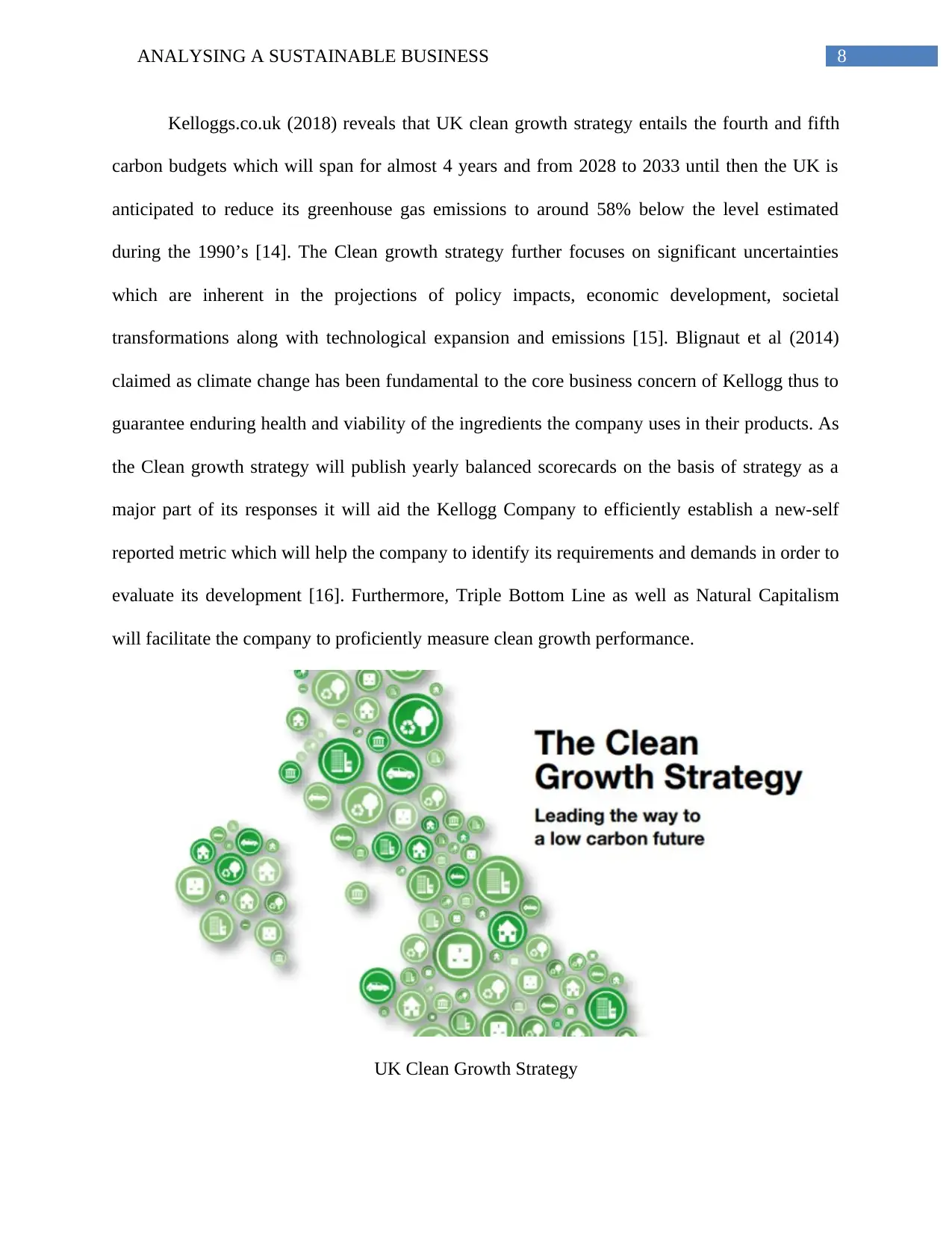
8ANALYSING A SUSTAINABLE BUSINESS
Kelloggs.co.uk (2018) reveals that UK clean growth strategy entails the fourth and fifth
carbon budgets which will span for almost 4 years and from 2028 to 2033 until then the UK is
anticipated to reduce its greenhouse gas emissions to around 58% below the level estimated
during the 1990’s [14]. The Clean growth strategy further focuses on significant uncertainties
which are inherent in the projections of policy impacts, economic development, societal
transformations along with technological expansion and emissions [15]. Blignaut et al (2014)
claimed as climate change has been fundamental to the core business concern of Kellogg thus to
guarantee enduring health and viability of the ingredients the company uses in their products. As
the Clean growth strategy will publish yearly balanced scorecards on the basis of strategy as a
major part of its responses it will aid the Kellogg Company to efficiently establish a new-self
reported metric which will help the company to identify its requirements and demands in order to
evaluate its development [16]. Furthermore, Triple Bottom Line as well as Natural Capitalism
will facilitate the company to proficiently measure clean growth performance.
UK Clean Growth Strategy
Kelloggs.co.uk (2018) reveals that UK clean growth strategy entails the fourth and fifth
carbon budgets which will span for almost 4 years and from 2028 to 2033 until then the UK is
anticipated to reduce its greenhouse gas emissions to around 58% below the level estimated
during the 1990’s [14]. The Clean growth strategy further focuses on significant uncertainties
which are inherent in the projections of policy impacts, economic development, societal
transformations along with technological expansion and emissions [15]. Blignaut et al (2014)
claimed as climate change has been fundamental to the core business concern of Kellogg thus to
guarantee enduring health and viability of the ingredients the company uses in their products. As
the Clean growth strategy will publish yearly balanced scorecards on the basis of strategy as a
major part of its responses it will aid the Kellogg Company to efficiently establish a new-self
reported metric which will help the company to identify its requirements and demands in order to
evaluate its development [16]. Furthermore, Triple Bottom Line as well as Natural Capitalism
will facilitate the company to proficiently measure clean growth performance.
UK Clean Growth Strategy
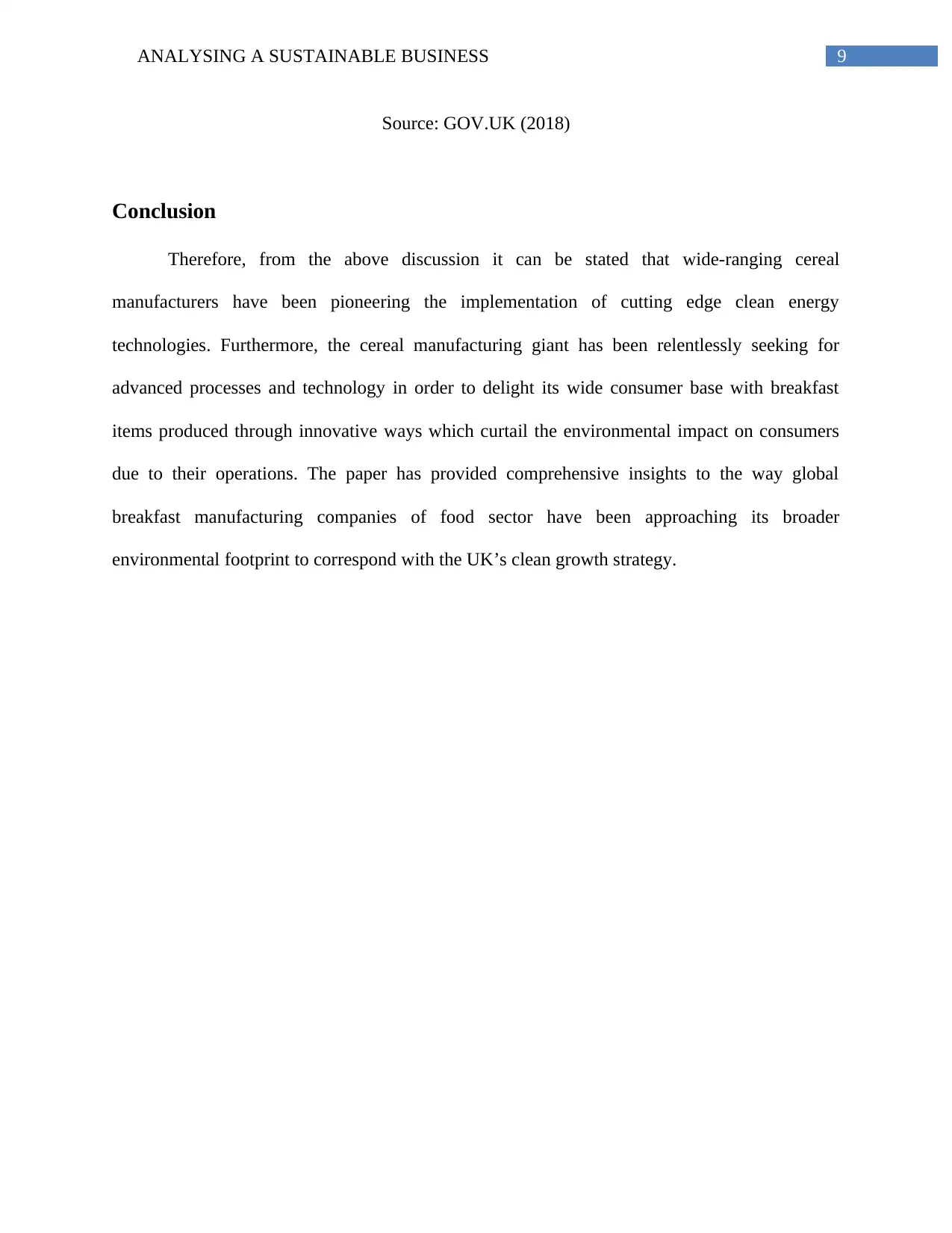
9ANALYSING A SUSTAINABLE BUSINESS
Source: GOV.UK (2018)
Conclusion
Therefore, from the above discussion it can be stated that wide-ranging cereal
manufacturers have been pioneering the implementation of cutting edge clean energy
technologies. Furthermore, the cereal manufacturing giant has been relentlessly seeking for
advanced processes and technology in order to delight its wide consumer base with breakfast
items produced through innovative ways which curtail the environmental impact on consumers
due to their operations. The paper has provided comprehensive insights to the way global
breakfast manufacturing companies of food sector have been approaching its broader
environmental footprint to correspond with the UK’s clean growth strategy.
Source: GOV.UK (2018)
Conclusion
Therefore, from the above discussion it can be stated that wide-ranging cereal
manufacturers have been pioneering the implementation of cutting edge clean energy
technologies. Furthermore, the cereal manufacturing giant has been relentlessly seeking for
advanced processes and technology in order to delight its wide consumer base with breakfast
items produced through innovative ways which curtail the environmental impact on consumers
due to their operations. The paper has provided comprehensive insights to the way global
breakfast manufacturing companies of food sector have been approaching its broader
environmental footprint to correspond with the UK’s clean growth strategy.
Secure Best Marks with AI Grader
Need help grading? Try our AI Grader for instant feedback on your assignments.
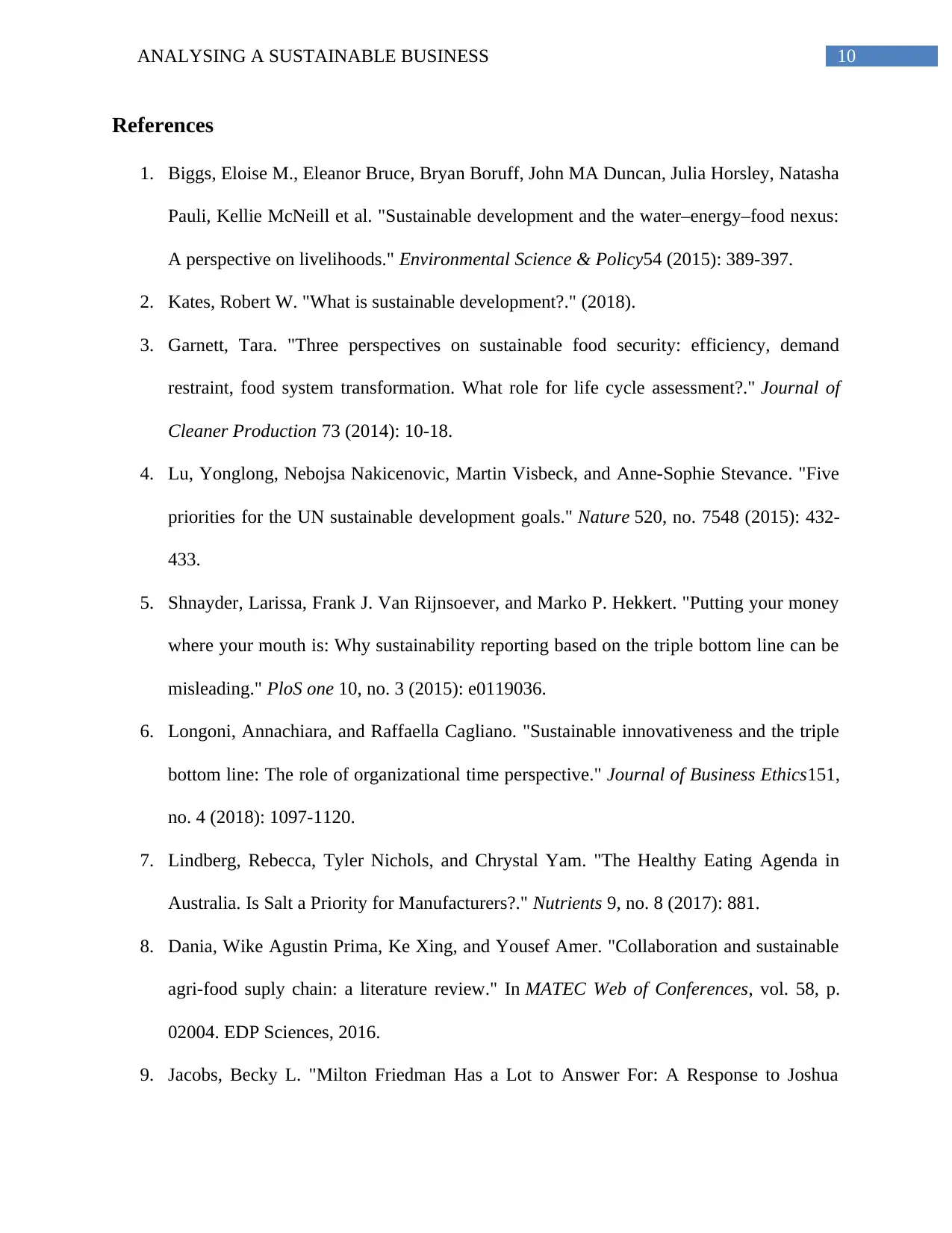
10ANALYSING A SUSTAINABLE BUSINESS
References
1. Biggs, Eloise M., Eleanor Bruce, Bryan Boruff, John MA Duncan, Julia Horsley, Natasha
Pauli, Kellie McNeill et al. "Sustainable development and the water–energy–food nexus:
A perspective on livelihoods." Environmental Science & Policy54 (2015): 389-397.
2. Kates, Robert W. "What is sustainable development?." (2018).
3. Garnett, Tara. "Three perspectives on sustainable food security: efficiency, demand
restraint, food system transformation. What role for life cycle assessment?." Journal of
Cleaner Production 73 (2014): 10-18.
4. Lu, Yonglong, Nebojsa Nakicenovic, Martin Visbeck, and Anne-Sophie Stevance. "Five
priorities for the UN sustainable development goals." Nature 520, no. 7548 (2015): 432-
433.
5. Shnayder, Larissa, Frank J. Van Rijnsoever, and Marko P. Hekkert. "Putting your money
where your mouth is: Why sustainability reporting based on the triple bottom line can be
misleading." PloS one 10, no. 3 (2015): e0119036.
6. Longoni, Annachiara, and Raffaella Cagliano. "Sustainable innovativeness and the triple
bottom line: The role of organizational time perspective." Journal of Business Ethics151,
no. 4 (2018): 1097-1120.
7. Lindberg, Rebecca, Tyler Nichols, and Chrystal Yam. "The Healthy Eating Agenda in
Australia. Is Salt a Priority for Manufacturers?." Nutrients 9, no. 8 (2017): 881.
8. Dania, Wike Agustin Prima, Ke Xing, and Yousef Amer. "Collaboration and sustainable
agri-food suply chain: a literature review." In MATEC Web of Conferences, vol. 58, p.
02004. EDP Sciences, 2016.
9. Jacobs, Becky L. "Milton Friedman Has a Lot to Answer For: A Response to Joshua
References
1. Biggs, Eloise M., Eleanor Bruce, Bryan Boruff, John MA Duncan, Julia Horsley, Natasha
Pauli, Kellie McNeill et al. "Sustainable development and the water–energy–food nexus:
A perspective on livelihoods." Environmental Science & Policy54 (2015): 389-397.
2. Kates, Robert W. "What is sustainable development?." (2018).
3. Garnett, Tara. "Three perspectives on sustainable food security: efficiency, demand
restraint, food system transformation. What role for life cycle assessment?." Journal of
Cleaner Production 73 (2014): 10-18.
4. Lu, Yonglong, Nebojsa Nakicenovic, Martin Visbeck, and Anne-Sophie Stevance. "Five
priorities for the UN sustainable development goals." Nature 520, no. 7548 (2015): 432-
433.
5. Shnayder, Larissa, Frank J. Van Rijnsoever, and Marko P. Hekkert. "Putting your money
where your mouth is: Why sustainability reporting based on the triple bottom line can be
misleading." PloS one 10, no. 3 (2015): e0119036.
6. Longoni, Annachiara, and Raffaella Cagliano. "Sustainable innovativeness and the triple
bottom line: The role of organizational time perspective." Journal of Business Ethics151,
no. 4 (2018): 1097-1120.
7. Lindberg, Rebecca, Tyler Nichols, and Chrystal Yam. "The Healthy Eating Agenda in
Australia. Is Salt a Priority for Manufacturers?." Nutrients 9, no. 8 (2017): 881.
8. Dania, Wike Agustin Prima, Ke Xing, and Yousef Amer. "Collaboration and sustainable
agri-food suply chain: a literature review." In MATEC Web of Conferences, vol. 58, p.
02004. EDP Sciences, 2016.
9. Jacobs, Becky L. "Milton Friedman Has a Lot to Answer For: A Response to Joshua
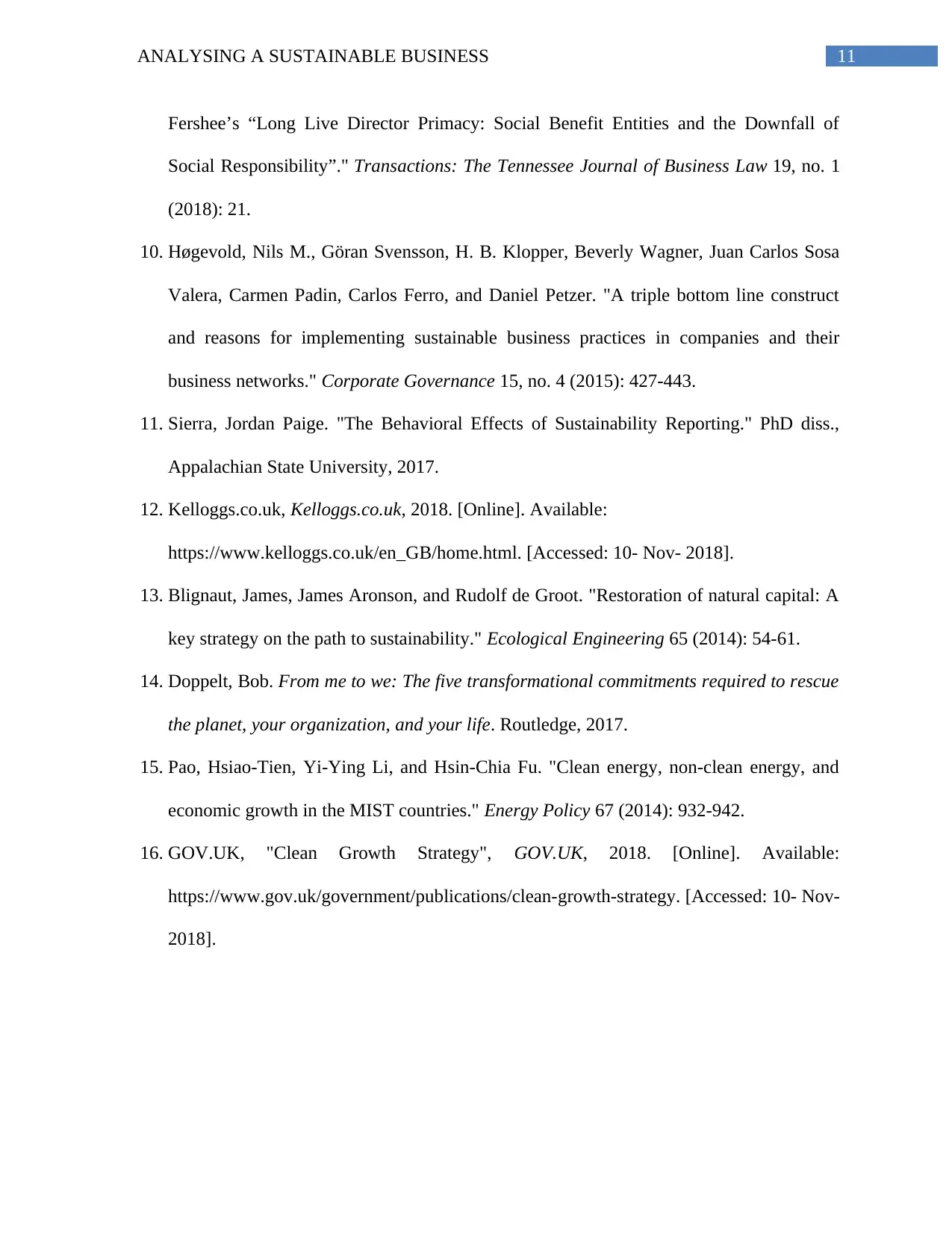
11ANALYSING A SUSTAINABLE BUSINESS
Fershee’s “Long Live Director Primacy: Social Benefit Entities and the Downfall of
Social Responsibility”." Transactions: The Tennessee Journal of Business Law 19, no. 1
(2018): 21.
10. Høgevold, Nils M., Göran Svensson, H. B. Klopper, Beverly Wagner, Juan Carlos Sosa
Valera, Carmen Padin, Carlos Ferro, and Daniel Petzer. "A triple bottom line construct
and reasons for implementing sustainable business practices in companies and their
business networks." Corporate Governance 15, no. 4 (2015): 427-443.
11. Sierra, Jordan Paige. "The Behavioral Effects of Sustainability Reporting." PhD diss.,
Appalachian State University, 2017.
12. Kelloggs.co.uk, Kelloggs.co.uk, 2018. [Online]. Available:
https://www.kelloggs.co.uk/en_GB/home.html. [Accessed: 10- Nov- 2018].
13. Blignaut, James, James Aronson, and Rudolf de Groot. "Restoration of natural capital: A
key strategy on the path to sustainability." Ecological Engineering 65 (2014): 54-61.
14. Doppelt, Bob. From me to we: The five transformational commitments required to rescue
the planet, your organization, and your life. Routledge, 2017.
15. Pao, Hsiao-Tien, Yi-Ying Li, and Hsin-Chia Fu. "Clean energy, non-clean energy, and
economic growth in the MIST countries." Energy Policy 67 (2014): 932-942.
16. GOV.UK, "Clean Growth Strategy", GOV.UK, 2018. [Online]. Available:
https://www.gov.uk/government/publications/clean-growth-strategy. [Accessed: 10- Nov-
2018].
Fershee’s “Long Live Director Primacy: Social Benefit Entities and the Downfall of
Social Responsibility”." Transactions: The Tennessee Journal of Business Law 19, no. 1
(2018): 21.
10. Høgevold, Nils M., Göran Svensson, H. B. Klopper, Beverly Wagner, Juan Carlos Sosa
Valera, Carmen Padin, Carlos Ferro, and Daniel Petzer. "A triple bottom line construct
and reasons for implementing sustainable business practices in companies and their
business networks." Corporate Governance 15, no. 4 (2015): 427-443.
11. Sierra, Jordan Paige. "The Behavioral Effects of Sustainability Reporting." PhD diss.,
Appalachian State University, 2017.
12. Kelloggs.co.uk, Kelloggs.co.uk, 2018. [Online]. Available:
https://www.kelloggs.co.uk/en_GB/home.html. [Accessed: 10- Nov- 2018].
13. Blignaut, James, James Aronson, and Rudolf de Groot. "Restoration of natural capital: A
key strategy on the path to sustainability." Ecological Engineering 65 (2014): 54-61.
14. Doppelt, Bob. From me to we: The five transformational commitments required to rescue
the planet, your organization, and your life. Routledge, 2017.
15. Pao, Hsiao-Tien, Yi-Ying Li, and Hsin-Chia Fu. "Clean energy, non-clean energy, and
economic growth in the MIST countries." Energy Policy 67 (2014): 932-942.
16. GOV.UK, "Clean Growth Strategy", GOV.UK, 2018. [Online]. Available:
https://www.gov.uk/government/publications/clean-growth-strategy. [Accessed: 10- Nov-
2018].
1 out of 12
Related Documents
Your All-in-One AI-Powered Toolkit for Academic Success.
+13062052269
info@desklib.com
Available 24*7 on WhatsApp / Email
![[object Object]](/_next/static/media/star-bottom.7253800d.svg)
Unlock your academic potential
© 2024 | Zucol Services PVT LTD | All rights reserved.




